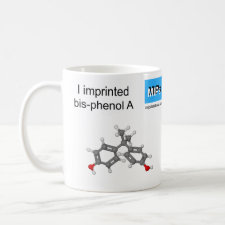
Authors: Kou LJ, Liang RN, Wang XW, Chen Y, Qin W
Article Title: Potentiometric sensor for determination of neutral bisphenol A using a molecularly imprinted polymer as a receptor.
Publication date: 2013
Journal: Analytical and Bioanalytical Chemistry
Volume: 405
Issue: (14)
Page numbers: 4931-4936.
DOI: 10.1007/s00216-013-6877-2
Abstract: The aim of this paper is to develop a potentiometric sensing methodology for sensitive and selective determination of neutral phenols by using a molecularly imprinted polymer as a receptor. Bisphenol A (BPA), a significant environmental contaminant, is employed as the model target. The BPA-imprinted polymer is synthesized by the semi-covalent technique and incorporated into a plasticized poly(vinyl chloride) membrane doped with the tridodecylmethylammonium salt. The present electrode shows a linear anionic potential response over the concentration range from 0.1 to 1 μM with a detection limit of 0.02 μM, and exhibits an excellent selectivity over other phenols. The proposed approach has been successfully applied to the determination of BPA released from real plastic samples. It offers promising potential in development of potentiometric sensors for measuring neutral phenols at trace levels
Template and target information: bisphenol A dimethacrylate, bisphenol A, BPA
Author keywords: Molecularly imprinted polymers, ion-selective electrodes, bisphenol A, phenols



Join the Society for Molecular Imprinting

New items RSS feed
Sign-up for e-mail updates:
Choose between receiving an occasional newsletter or more frequent e-mail alerts.
Click here to go to the sign-up page.
Is your name elemental or peptidic? Enter your name and find out by clicking either of the buttons below!
Other products you may like:
 MIPdatabase
MIPdatabase









